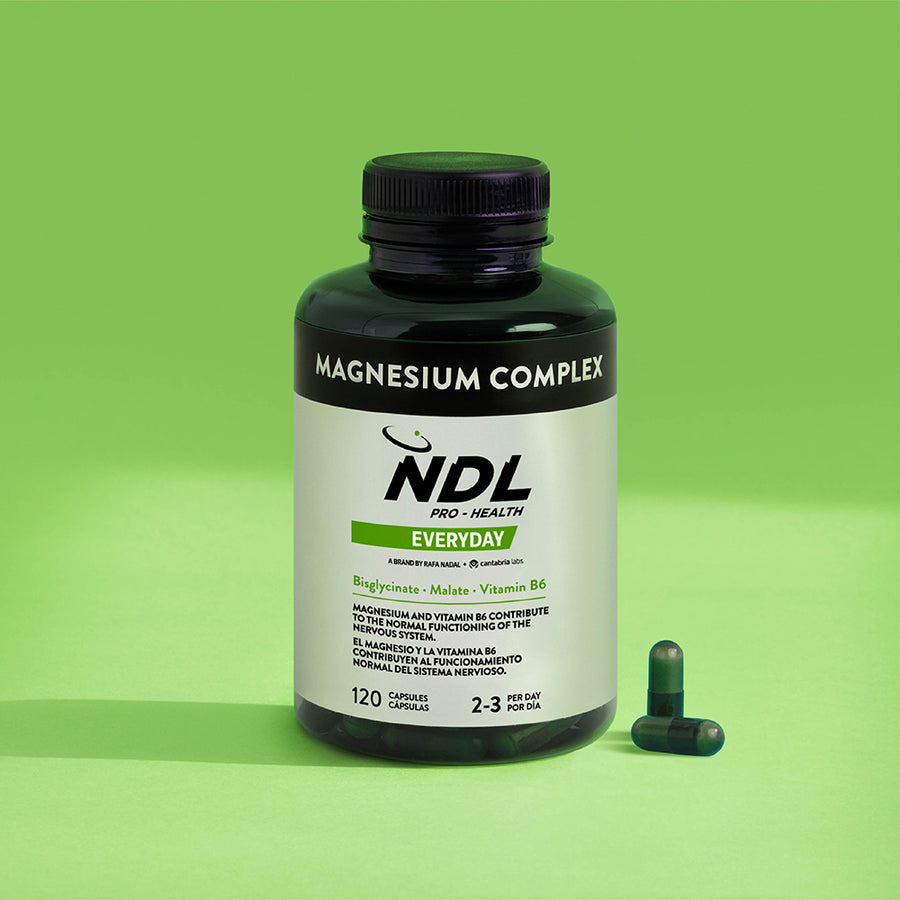Featured Products

Triple Magnesium
See productWhat is magnesium good for? Magnesium is an essential mineral for the proper functioning of the human body, involved in over 300 biochemical reactions. It plays a key role in energy production, muscle and nerve function, and protein synthesis.
It also helps regulate blood sugar levels, supports bone health, and contributes to maintaining a stable heart rhythm. An adequate intake of magnesium is key to preventing issues like fatigue, muscle cramps, and sleep disorders, making it a vital nutrient for maintaining overall body balance.

What is Magnesium and Why Is It Important?
As mentioned, magnesium is an essential mineral for the human body, as it plays a role in numerous vital functions such as energy production, muscle contraction, nerve function, and protein synthesis. The benefits of magnesium are especially relevant in sports, as it’s key for physical performance and muscle recovery.
During physical activity, magnesium helps regulate muscle contraction and relaxation, preventing cramps and spasms that can affect performance. It also supports energy production by participating in carbohydrate and fat metabolism, allowing athletes to maintain sustained effort. It further contributes to muscle recovery by reducing inflammation and damage after intense exercise.
A magnesium deficiency can lead to fatigue, muscle weakness, and increased injury risk, highlighting its importance for athletes. Maintaining proper magnesium levels is crucial for optimizing performance, endurance, and recovery in sports.
When Should You Consider a Magnesium Supplement?
While a balanced diet including magnesium-rich foods is typically sufficient to meet daily needs, certain situations may require increased intake, especially for athletes and active individuals.
When this occurs, magnesium supplements are the best option, particularly in the following cases:
- Intense and prolonged training: During long or high-intensity workouts, the body loses magnesium through sweat. If you train frequently at a high level, your magnesium levels may drop, affecting performance, leading to early fatigue or increasing cramp risk.
- Frequent muscle cramps: Cramps, especially during or after exercise, can signal insufficient magnesium levels. This mineral plays a key role in muscle relaxation, and its deficiency may cause painful involuntary contractions.
- Fatigue and slow recovery: If you feel tired easily during training or recover slowly, magnesium may help. It supports protein synthesis and energy production, which contribute to better post-workout recovery and reduced fatigue.
- Low-magnesium diet: Foods like nuts, seeds, spinach, and whole grains are rich in magnesium, but lacking them in your diet puts you at risk of deficiency. Restrictive or low-carb diets may also reduce magnesium intake, making supplementation helpful.
- Stress and sleep problems: One of magnesium’s main benefits is its calming effect on the nervous system, which may improve sleep quality. If you experience stress or sleep difficulties, magnesium may help with both mental relaxation and physical recovery, since proper rest is key to muscle regeneration.
Before taking a magnesium supplement, it is recommended to consult a healthcare professional or nutritionist to ensure you truly need it and to get the appropriate dosage.
Types of Magnesium Supplements: Which One to Choose?
There are various forms of magnesium, each with different properties and uses. Choosing the right one depends on your specific needs:
- Magnesium citrate: One of the most common and easily absorbed types. Often used for constipation relief and digestion support. Ideal if you want to improve gut health along with muscular benefits.
- Magnesium chloride: Highly absorbable and often used to balance overall magnesium levels. It may also help detoxify and relieve muscle pain.
- Magnesium glycinate: Gentle on the stomach and well-absorbed. Commonly used to improve sleep due to magnesium’s benefits for sleep and anxiety. Great if you're also seeking relaxation and recovery.
- Magnesium oxide: Less bioavailable but contains more elemental magnesium. Helps prevent muscle cramps, replaces magnesium lost through sweat, and aids energy production.
- Magnesium malate: Known for supporting energy production, making it a good choice for athletes seeking better performance and recovery.
- Magnesium carbonate: Although it has lower absorption, it offers useful properties for sports such as maintaining adequate magnesium levels to prevent cramps, aiding cellular energy production, and acting as a natural antacid.
Below is a table of our magnesium supplements:
In conclusion, magnesium’s benefits make it an essential mineral for proper body function, playing a crucial role in health and athletic performance.
It helps regulate muscle function, energy production, and recovery after exercise, while also preventing cramps and fatigue. While a balanced diet usually provides enough magnesium, athletes and individuals with higher needs may benefit from supplementation, especially under intense training or dietary deficiencies.
There are various types of magnesium supplements, such as citrate, glycinate, oxide, and carbonate, each with specific properties that should be selected according to individual needs and performance goals.

From the NDL Pro-Health team we will provide you with tips to maintain a healthy lifestyle. Sharing knowledge and product recommendations to offer optimal solutions for your daily routine, for your workouts and subsequent recovery, all with the goal of helping you achieve physical and mental wellness.























